|
|
|
Sort Order |
|
|
|
Items / Page
|
|
|
|
|
|
|
| Srl | Item |
| 1 |
ID:
155116
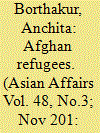

|
|
|
|
|
| Summary/Abstract |
One of the most important arenas that have been profoundly affected by the security situation in Afghanistan is Pakistan's internal security environment. The instability in Afghanistan has had a negative spill-over effect on Pakistan's domestic security scenario, as the Afghan quagmire poses immense implications on Pakistan's domestic framework. One of the important consequences of the Afghan conflict since the 1970s has been the massive inflow of the Afghan refugee population to the neighbouring Pakistan which in following years has brought about a number of demographic and security challenges to the Pakistani society. Therefore along with a number of factors, at this present juncture, Afghan refugees have also become a principal factor in determining Pakistan's Afghanistan policy.
|
|
|
|
|
|
|
|
|
|
|
|
|
|
|
|
| 2 |
ID:
155115
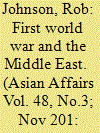

|
|
|
|
|
| Summary/Abstract |
The First World War in the Middle East swept away five hundred years of Ottoman dominion. It ushered in new ideologies and radicalized old ones – from Arab nationalism and revolutionary socialism to impassioned forms of atavistic Islamism. It created heroic icons, like the enigmatic Lawrence or the modernizing Atatürk, and it completely re-drew the map of the region, forging a host of new nation states, For many, the self-serving intervention of these powers in the region between 1914 and 1919 is the major reason for the conflicts that have raged there on and off ever since. Yet many of the most common assertions about the First World War in the Middle East and its aftermath are devoid of context. This article argues that, far from being a mere sideshow to the war in Europe, the Middle Eastern conflict was in fact the centre of gravity in a war for imperial interests. Moreover, contrary to another persistent myth of the First World War in the Middle East, local leaders and their forces were not simply the puppets of the Great Powers. The way in which these local forces embraced, resisted, succumbed to, disrupted, or on occasion overturned the plans of the imperialist powers for their own interests in fact played an important role in shaping the immediate aftermath of the conflict – and in laying the foundations for the troubled Middle East.
|
|
|
|
|
|
|
|
|
|
|
|
|
|
|
|
| 3 |
ID:
155113
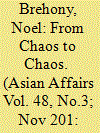

|
|
|
|
|
| Summary/Abstract |
Fifty years after the British departure the future of South Arabia or South Yemen is just as uncertain as it was on 30 November 1967, when the People's Republic of South Yemen (PRSY) came into existence. The old order was swept away in the revolutionary tide of the mid- 20th century to be replaced by a Marxist state. Yet, within less than 23 years the new order was undermined by unresolved issues inherited from South Arabia and led to an ill-prepared union with the Yemen Arab Republic (YAR) in 1990. Today, after over two and half years of war, Yemen is fragmenting and one outcome might be the return of a southern state which will have to confront the same unresolved issues. Are southerners Yemenis or South Yemenis? Can institutions be created to overcome tribal and regional differences with the South? Can a viable economy be created in a country with so few natural resources? This article provides a history of the region and the conflicts of the last 50 years, along with a consideration of the present situation and a discussion of the enduring issues.
|
|
|
|
|
|
|
|
|
|
|
|
|
|
|
|
| 4 |
ID:
155112
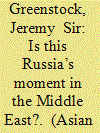

|
|
|
|
|
| Summary/Abstract |
Sir Jeremy Greenstock, formerly British permanent representative to the UN, who has had long experience of dealing with Russia in the context of diplomacy, considers whether the current moment of Russian dominance in Syria and the Middle East, combined with the recent general disengagement of the western powers in the region, could be considered as marking the beginning of a general period of Russian hegemony in the Middle East. The article takes into account the global geopolitical situation, the recent history of Russia and the Middle East, the consequences of western intervention in Iraq, and the motivations of the Russian government particularly in view of its recent engagement in Ukraine.
|
|
|
|
|
|
|
|
|
|
|
|
|
|
|
|
| 5 |
ID:
155117
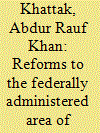

|
|
|
|
|
| Summary/Abstract |
In March 2017, Pakistan formally took the decision to begin a process of incorporating the Federally Administered Tribal Territories into the framework of regular Pakistani law. This article offers an overview of the historical system of governance of the Tribal territories, along with a discussion of the development of the recent reforms and their prospects for success.
|
|
|
|
|
|
|
|
|
|
|
|
|
|
|
|
| 6 |
ID:
155114
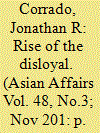

|
|
|
|
|
| Summary/Abstract |
Why has loyalty to the Kim Family Regime and the Worker’s Party diminished over the past twenty years despite a rise in the average standard of living, greater social mobility, and a regime policy of benign neglect towards marketization? Unthinkable in the Kim Il Sung era, the increase in expressions of resentment toward the North Korean authorities represents a shift in the ideology, behavior, and motivation of the population. Four critical factors have heightened tensions between state and society in North Korea, leading to a reduction in loyalty among the general population. The author considers the impact of labor mobilizations, the declining importance of party membership, the influence of foreign media, and the rise of rent seeking and extractive policies. While all play a role, it is important and possible to identify the primary cause. Extractive policies and rent-seeking position the regime and the people in a directly adversarial relationship. All tiers and agencies of the government have become complicit in efforts to siphon off profits, control market actors through crony capitalism, rent seek, over-regulate, and compete against private market actors, causing the residents to express frustration and resentment towards a government that does not have their interests at heart.
|
|
|
|
|
|
|
|
|
|
|
|
|
|
|
|
|
|
|
|
|